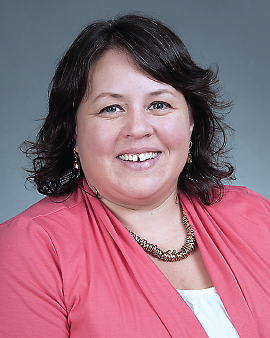Psychiatrist Finds Rewards In Teaching Collaborative Care
Abstract
A psychiatrist’s role in a collaborative team-based model is in part educational, serving as the source of knowledge for care managers and primary care staff. This is the seventh in a series profiling psychiatrists in integrated care.

The idea behind training clinicians in the integrated care model is that clinicians “really learn best in the context of doing their work, so it’s an immersive educational experience,” says educator Anna Ratzliff, M.D.
“I have always been interested in interfaces,” said psychiatrist Anna Ratzliff, M.D., Ph.D.
This early-career psychiatrist with Ph.D. training in the basic sciences had thought when she finished her training that she might spend her career working at the juncture of psychiatry and research. But as a graduate of the psychiatry residency program at the University of Washington (UW) School of Medicine, which has been a critical incubator of the movement toward integrated care and, specifically, the collaborative-care model, she became drawn to that crossroads where psychiatry and primary and general medical care meet.
Today she is associate director for education in the Division of Integrated Care and Public Health at UW, where she is also at the juncture of education and clinical work, training residents and established practicing psychiatrists in the skills and theoretical outlook necessary to work in a collaborative-care setting.

“In my role I am thinking about how to train a psychiatry workforce to be able to provide evidence-based integrated, collaborative care,” she told Psychiatric News. “I look at how can we train individual psychiatrists and other clinicians, as well as how can we can disseminate better strategies to health care systems that improve the quality of mental health care and at the same time reach more people.
“When I finished training, I thought I would be a research clinician helping to use basic science to come up with new treatment modalities,” she continued. “But at UW I have found two things that I really like—working in teams and the interaction between primary care and mental health care.”
You Learn By Doing
Ratzliff also has a clinical practice, working in the collaborative-care model developed by Wayne Katon, M.D., and Jürgen Unützer, M.D., at UW. In that model, a psychiatrist works closely with a “care manager” and primary care staff managing the mental health needs of an entire caseload or population.
Teaching, of course, has its own rewards and informs her clinical practice. “Almost everything I do is about education,” she said. “The consulting psychiatrist really becomes the source of knowledge for evidence-based practice and treatment for both the care managers and the primary care physicians. I’m seen as a trusted resource.”
That an educational component is “built into” the integrated-collaborative care model is one of its strengths, Ratzliff said, because it means that clinicians “learn by doing” and in the context of their own work—which educators know is one of the best ways to learn.
And that principle of learning by doing is incorporated into her work both with residents and with established psychiatrists who seek out training in integrated care through UW’s AIMS Center. The center offers individual and group-based learning through in-person and online formats; learning opportunities vary in length from one-hour presentations and webinars to multiday training meetings to a six-month academic certificate program. Ratzliff and colleagues have also offered training seminars at APA meetings.
For residents, lectures on integrated care are introduced in the didactics of the second year. All residents—and practicing psychiatrists who are trained through the AIMS Center—are taught the following core principles of collaborative, team-based care:
Patient-centered care: Primary care and behavioral health providers collaborate effectively using shared care plans. It’s important to remember that co-location does not necessarily mean collaboration. | |||||
Population-based care: The care team shares a defined group of patients tracked in a registry. Practices track and reach out to patients who are not improving, and mental health specialists provide caseload-focused consultation, not just ad-hoc advice. | |||||
Measurement-based treatment to target: Each patient’s treatment plan clearly articulates personal goals and clinical outcomes that are routinely measured. Treatments are adjusted if patients are not improving as expected. | |||||
Evidence-based care: Patients are offered treatments for which there is credible research evidence to support their efficacy in treating the target condition. | |||||
Accountable care: Providers are accountable and reimbursed for quality care and outcomes. | |||||
There is an integrated-care journal club and a “career pathways” program for those interested in pursuing a career in collaborative care. In the fourth year, residents can do a six-month rotation in collaborative care, working with supervision as a consultant to a care manager and primary care staff to help manage the mental health care of a defined population.
“Again, the idea is that people really learn best in the context of doing their work,” she said, “so it’s an immersive educational experience.”
Putting Care ‘Back Together’
Ratzliff noted that the Milestone Project, the initiative of the Accreditation Council for Graduate Medical Education to introduce measurement of discrete skills and competencies into residency training, includes among its core physician competencies “systems-based practice” (Psychiatric News, August 28).
So collaborative care, she believes, is a trend that will become only more important. And for this clinician-educator who has always wanted to be at the interface of things, the integrated-care movement is a way to return mental health care to its rightful place.
“Collaborative care is at the interface of medicine and psychiatry and works to bring them back together the way they should be,” she said. “I think this may draw more people into our profession because it can be attractive to medical students who may have thought they had to choose between one or the other.” ■
Resources on integrated care for members are posted on APA’s website at http://www.psychiatry.org/practice/professional-interests/integrated-care. A primer on integrated care through a series of FAQs is posted at http://psychnews.psychiatryonline.org/newsarticle.aspx?articleid=1742623.



